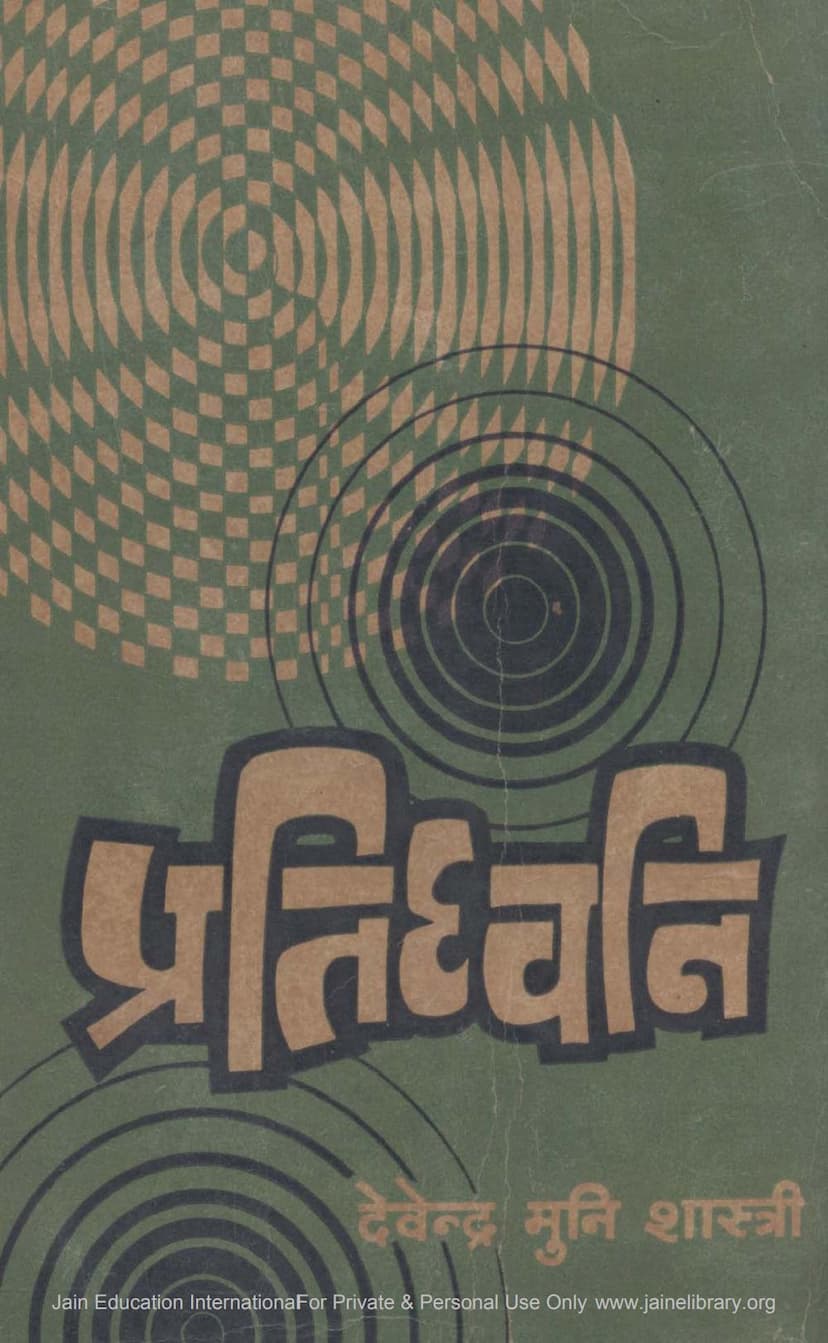Pratidhwani
Added to library: September 2, 2025

Summary
This is a comprehensive summary of the Jain text "Pratidhwani" by Devendramuni, based on the provided catalog link and pages:
Book Title: Pratidhwani (प्रतिध्वनि) Author: Devendramuni Shastri, Sahityaratna (देवेन्द्र मुनि शास्त्री, साहित्यरत्न) Publisher: Shri Tarak Guru Jain Granthalay, Padraada (Udaipur) Catalog Link: https://jainqq.org/explore/003199/1
Overall Summary:
"Pratidhwani" (Echo) is a collection of short inspirational stories and allegorical tales authored by Devendramuni Shastri. The book aims to provide mental relaxation and new inspiration and impetus to readers. It is presented as light and enjoyable reading, akin to easily digestible and flavorful food alongside heavy meals, complementing the study of serious subjects.
The book is dedicated to the author's guru, Shri Pushkar Muni Ji M.S., acknowledging his profound inspiration and guidance. The editor, Shrichand Surana 'Saras', highlights that the collection is not just a storybook but also a treatise of thoughts, containing motivational ideas, experienced aphorisms, and sayings of great personalities.
Key Themes and Content:
The book is structured as a collection of 73 short stories and parables, each designed to convey a clear message. The stories cover a wide range of philosophical, ethical, and spiritual themes central to Jainism and broader Indian thought. Some of the prominent themes and stories include:
- The Power of Inner Reflection and Self-Reliance: The title story, "Pratidhwani" (Echo), emphasizes that our external world is a mere echo of our internal thoughts and feelings. This theme is explored in stories like "Appa Deepo Bhava" (Be Your Own Light), which draws inspiration from Buddhist teachings, advocating for self-reliance and inner enlightenment.
- The Nature of God and Devotion: Stories like "Apni-Apni Kalpana, Apna-Apna Ishwar" (One's Own Imagination, One's Own God) and "Swami banam Rakshak?" (Master or Protector?) delve into diverse perceptions of the divine and the nature of true devotion, questioning superficiality.
- The Ideals of Indian Womanhood: Stories such as "Bhartiya Nari ka Adarsh" (The Ideal of Indian Womanhood) and "Mata ki Pratikriti" (Mother's Replica) highlight exemplary qualities of Indian women, emphasizing self-control, resilience, forgiveness, and devotion through historical and mythological examples like Parvati, Shakuntala, and Sita.
- The Importance of Action and Character over Appearance: Numerous stories, including "Dikhawa ki Bhakti" (Hypocritical Devotion), "Sachha Sadhu" (True Monk), and "Dil Badal!" (Change Your Heart!), critique outward show and emphasize the significance of inner character, sincere actions, and true renunciation.
- The Law of Karma and Consequences: Stories like "Paap Palat kar Aata Hai" (Sin Returns) and "Jaisi Drishti: Vaisi Srishti" (As Your Vision, So Your World) illustrate the principle that actions have consequences, and one reaps what one sows.
- The Value of Wisdom and Prudence: Narratives like "Amulya Shlok" (Invaluable Verse), "Buddhi ko Ulatiye" (Invert Your Intellect), and "Naya Ashcharya" (New Wonder) offer lessons on foresight, careful consideration, and the dangers of ignorance and misplaced priorities, often through historical anecdotes.
- The Nature of True Wealth and Renunciation: Stories like "Karoon ka Khazana" (Qarun's Treasure) and "Asli Sona" (Real Gold) differentiate between material wealth and spiritual wealth, advocating for detachment from possessions and the pursuit of inner riches.
- The Importance of Empathy and Understanding: Tales like "Par Ki Peeda" (Others' Pain) and "Tu Bhi So Jata" (You Too Sleep) promote empathy and the understanding of others' suffering, urging readers to consider their actions' impact.
- The Transformative Power of Friendship and Forgiveness: Stories like "Mitra Banakar" (By Making Friends) and "Kshama ka Adarsh" (Ideal of Forgiveness) demonstrate how kindness, forgiveness, and genuine friendship can overcome animosity and transform individuals.
- The Illusion of Materialism and the Pursuit of True Happiness: Stories like "Samraton ke Samrat" (Emperor of Emperors) and "Mohjaal" (Web of Delusion) underscore that true happiness and power lie not in material possessions or worldly status but in inner contentment and freedom from desires.
Editorial and Publishing:
- Editor: Shrichand Surana 'Saras' played a significant role in editing the stories, adding depth and uniqueness to them.
- Financial Support: The publication of the book was made possible through the financial generosity of Shri Chandanmal Ji Mehta, in memory of his late father, Seth Hasti Mal Ji Mehta. Seth Hasti Mal Ji Mehta is described as a philanthropic and benevolent merchant who, despite his wealth, lived a simple life and contributed significantly to societal welfare.
- Style and Presentation: The book is noted for its novel style in storytelling, often preceded by inspiring quotes from world-renowned thinkers. The language is described as refined and accessible.
In essence, "Pratidhwani" serves as a guide for navigating life's complexities by drawing lessons from wisdom, ethics, and spiritual principles, encouraging readers to cultivate inner strength, compassion, and self-awareness.